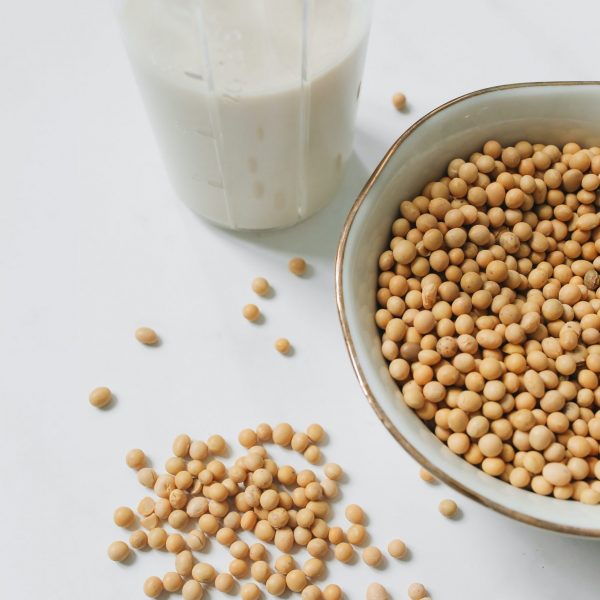In the last 15 years, soy foods have gone from being all the rage to being on the hit list of foods to avoid for fertility. In this article, I will try to demystify soy and the reasons why we suggest avoiding processed soy or large amounts of soy for health and fertility. I will also discuss how traditional soy foods used in moderation can offer health and fertility benefits, especially for women with PCOS.
Soy Foods: Pros and Cons
First, I want to share that it’s my opinion that traditional, non-GMO, unprocessed soy foods- miso, tempeh, tofu, edamame or natto – consumed in moderation (1-2 times a week) aren’t known to present a fertility concern for most people. Traditional soy foods are highly nutritious. They are a complete protein, with all nine essential amino acids, and a good source of B vitamins. They’re also rich in minerals like calcium, iron and zinc; and phytoestrogens, which offer benefits in small amounts.
Soy foods are a good protein source for vegetarians. Soy protein is easier for the kidneys to process than protein from meat. Clinically, soy foods have been found to lower bad LDL cholesterol and insulin levels for people with diabetes. Some evidence suggests a traditional Asian diet with soy foods can lower cancer risk.
Soy and PCOS: The Good News
Polycystic Ovarian Syndrome (PCOS) is a huge fertility concern for women today. PCOS is a suspected cause of around 70% of all female fertility issues. Further, some types of PCOS increase the risk for other serious concerns like type 2 diabetes and heart disease.
A recent study published in Journal of Clinical Endocrinology and Metabolism shows a diet containing soy isoflavones can improve metabolic and cardiovascular health in women with PCOS. In the study, the women received either 50 mg soy isoflavones or a placebo. The women receiving soy had lower insulin levels, LDL cholesterol, triglycerides and testosterone- all good news for PCOS management and fertility.
What’s the Bad News?
Soy foods are not for everyone. In TCM (Traditional Chinese Medicine), soy foods have a damp energy and can lead to stagnation in the digestive system. People with digestion issues often experience gas, bloating or IBS symptoms from soy foods. In these cases, soy is an inflammatory food to avoid for fertility building and general health.
Thyroid problems (which impact fertility and miscarriage risk) are often worsened by a diet high in soy. Soy contains goitrogens, which block normal thyroid activity. Some research suggests excess soy may even cause hypothyroidism or goiter. (Note: Like cruciferous vegetables, the goitrogenic activity of soy can be minimized by fermentation or cooking.)
Most worrisome: Today, up to 94% of soy is produced with genetically modified organisms (GMOs). Since the introduction of GMO soy in 1997, soy allergies have increased 50%! GMO soy is “Roundup Ready” and heavily sprayed with pesticides that you want to avoid for your fertility health. Research suggests GMO foods themselves could negatively impact fertility.
Soy Phytoestrogens
Naturally Occurring Soy vs. Commercial Soy Isolates: Research on the metabolic activity of soy’s phytoestrogens is not conclusive. Some studies show a favorable health effect for soy phytoestrogens while others suggest some types of soy may increase the risk for hormone-driven cancer, dementia or other health problems.
Unfortunately, it’s difficult to make a blanket statement on these studies. They have all been very different, exploring the effects of different types of soy in different circumstances. We’re only learning how to connect the dots and what these studies may really mean for health and fertility.
Find A Balance
It’s my opinion that processed soy, GMO soy and high doses of soy isoflavones could lead to fertility and health concerns for some people. Use common sense when using soy. Overloading with any one food is not good for your health. Highly processed soy foods (soy milk, soy hot dogs, soy patties) are not any better for your health than other processed foods in a box.
Yet, traditional soy foods like miso, tempeh, tofu, edamame or natto work fine in moderation for most people. If you have digestive issues, cultured soy foods like tempeh, miso, and natto are the easiest to digest. Make sure your diet is balanced. If you are a vegetarian, make sure you’re choosing from other high-quality plant proteins like legumes, other beans, hemp or plant protein, spirulina, sprouted grains, quinoa, and nuts and seeds.
If you have PCOS or risk factors for PCOS, a little traditional soy food in your diet can help support insulin balance and cardiovascular health. Just make sure you’re not overdoing it, and that the soy foods you choose come from non-GMO sources.
- About Genetically Engineered Foods. (n.d.). Retrieved from: http://www.centerforfoodsafety.org/issues/311/ge-foods/about-ge-foods#
- Doerge, D. R., & Sheehan, D. M. (2002). Goitrogenic and estrogenic activity of soy isoflavones. Environmental Health Perspectives, 110(Suppl 3), 349-353. doi:10.1289/ehp.02110s3349. Retrieved from: https://www.ncbi.nlm.nih.gov/pmc/articles/PMC1241182/
- Fermented vs. Unfermented Soy: Which Is Better? (n.d.). Retrieved from: http://probiotics.mercola.com/fermented-vs-unfermented-soy.html
- Brazier, Y. (2016, January 27). Can soy boost fertility treatment success? Retrieved from: http://www.medicalnewstoday.com/articles/305662.php
- Nichols, H. (2016, August 05). Soy may prevent diabetes, heart disease for women with PCOS. Retrieved from: http://www.medicalnewstoday.com/articles/312154.php
- Genetically Engineered Soybeans May Cause Allergies. (n.d.). Retrieved from: http://articles.mercola.com/sites/articles/archive/2010/07/08/genetically-engineered-soybeans-may-cause-allergies.aspx





